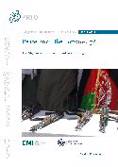
A new PRIO paper by Deedee Derksen presents research findings on a key component of the international community and Afghan government’s efforts to end the conflict in Afghanistan – the Afghanistan Peace and Reintegration Program, or APRP. Since late 2010 the APRP has tried to entice insurgents away from the battlefield with promises of security, jobs and other incentives – provided they pledge to renounce violence, respect the Afghan constitution and cut ties with al-Qaeda. The program faces challenges, and as a result of both implementation problems and problems of political context, has shown limited results to date. This paper examines the effectiveness and impact of the APRP and makes recommendations for further development of a robust reintegration infrastructure to support peace in Afghanistan. It focuses on overall patterns and trends in two provinces, Helmand and Baghlan and is based on documentary and press sources, and about 65 primary interviews conducted in those two provinces as well as in Kabul.
The research has been conducted under the joint Chr. Michelsen Institute - United States Institute of Peace - PRIO project 'Achieving Durable Peace in Afghanistan', which seeks to identify and clarify through research and dialogue key domestic issues and options for Afghanistan to move towards durable peace.
Download the paper here: http://www.prio.no/Research-and-Publications/Publication/?oid=1866578
A policy brief summarizing the findings is also published by project partner the United States Institute for Peace and can be downloaded here: http://www.usip.org/publications/impact-or-illusion-reintegration-under-the-afghanistan-peace-and-reintegration-program
Previous publications detail the findings of research on Afghan stakeholder perspectives on the peace process and can be downloaded here: http://www.prio.no/Research-and-Publications/Publication/?oid=650863





